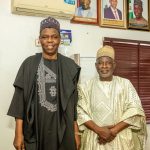The Minister of Solid Minerals Development, Dr. Dele Alake, has announced that the South West region contributed the highest revenue to Nigeria’s mining sector in 2025, accounting for ₦7.2 billion out of the ₦30 billion generated between January and September.
Dr. Alake made the disclosure on Wednesday, October 29, at the South West Leaders Conference in Akure, Ondo State, where he highlighted the progress made under the Tinubu administration’s mining sector reforms.
He said the reforms, anchored on the Ministry’s Seven-Point Agenda, have repositioned the solid minerals sector for domestic growth and global competitiveness. According to him, the agenda introduced stricter enforcement, transparency, and security mechanisms to curb illegal mining and boost government revenue.
The Minister noted that the establishment of the Mining Marshals under the Nigerian Security and Civil Defence Corps (NSCDC) has restored over 90 mining sites previously occupied by bandits and led to the prosecution of more than 300 violators of the Nigerian Mining and Minerals Act. He added that the improved security situation encouraged miners to return to their sites, resulting in higher productivity and revenue.
“Against the ₦8.6 billion collected from mining in 2022, the figure rose to ₦14.9 billion in 2023 and ₦38 billion in 2024. As of September this year, we have recorded ₦30 billion, with the South West contributing ₦7.2 billion,” Alake said.
Highlighting the contribution of the Segilola Gold Project in Osun State, Alake described it as Nigeria’s most successful gold mining venture, with a turnover of $193 million in 2024 and a workforce of over 2,000, 80 percent of whom are youths under 40.
He also revealed that companies from the South West hold 1,801 of the 9,592 mineral titles issued nationwide, including 630 exploration licenses and 836 small-scale mining leases. Ogun State tops the list with 481 titles, followed by Oyo with 440 and Osun with 374.
According to the Minister, the Federal Government has also digitized the registration of mining cooperatives, with 80 captured so far in the South West, which has a total of 369 cooperatives comprising 5,734 members.
In a bid to promote transparency and revenue generation, the Ministry has embarked on a ₦2.5 billion mines satellite monitoring project to track mineral license coordinates, detect illegal operations, and report mineral transportation revenues in real-time.
Dr. Alake also announced the creation of the Nigerian Solid Minerals Company, which will take over the defunct Nigerian Mining Corporation. The company will operate on a public-private model, with 50 percent of shares allocated to mega mining companies, 25 percent to the Federal Government, and 25 percent to Nigerian investors through an initial public offering (IPO).
He stated that reforms in the licensing and royalties regime led to the revocation of 3,794 dormant titles, a move that reduced speculation and encouraged mergers and acquisitions within the industry. This, he said, has boosted the revenue of the Mining Cadastral Office from ₦6 billion in 2023 to ₦12.5 billion in 2024 and ₦26.7 billion so far in 2025.
On international engagement, Alake said Nigeria’s push for value addition has inspired other African countries, leading to the creation of the Africa Minerals Strategy Group (AMSG), with him elected as the pioneer chairman.
He disclosed that the policy has attracted new foreign investments, including a $400 million rare earth processing plant and $1.7 billion lithium processing projects by Asba Company, Canmax Technology, and Avatar New Energy Nigeria Company.
Citing reports from the National Bureau of Statistics (NBS) and the Nigerian Extractive Industry Transparency Initiative (NEITI), the Minister noted that the solid minerals sector grew from 2.84 percent in 2023 to 4.85 percent in 2024, while its contribution to the national GDP rose from 5.56 to 5.64 percent.
Dr. Alake concluded by urging South West leaders and traditional rulers to support government efforts against illegal mining, encourage cooperatives, and promote value addition, stressing that the region’s potential in the mining sector could shape Nigeria’s economic future.








